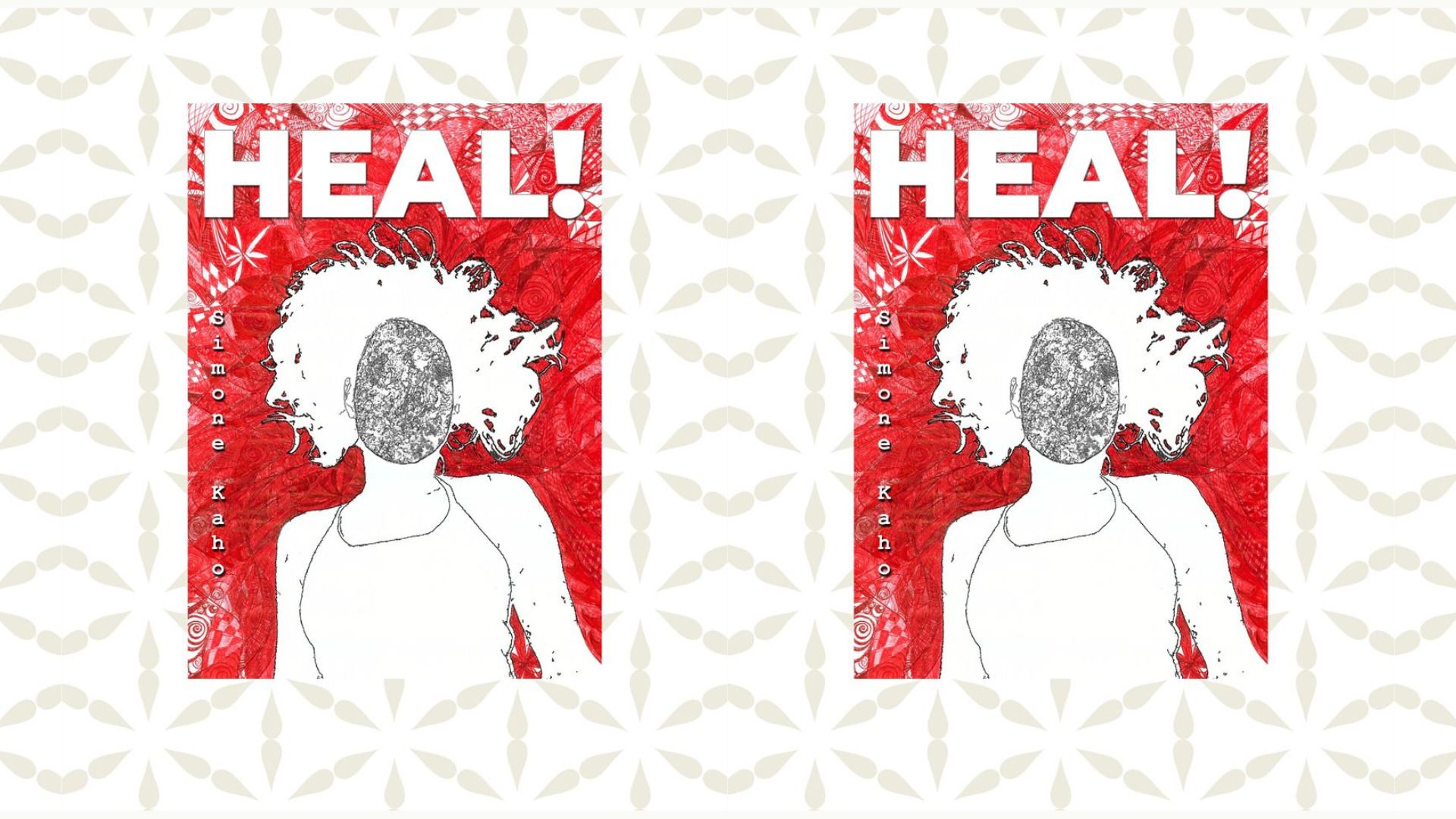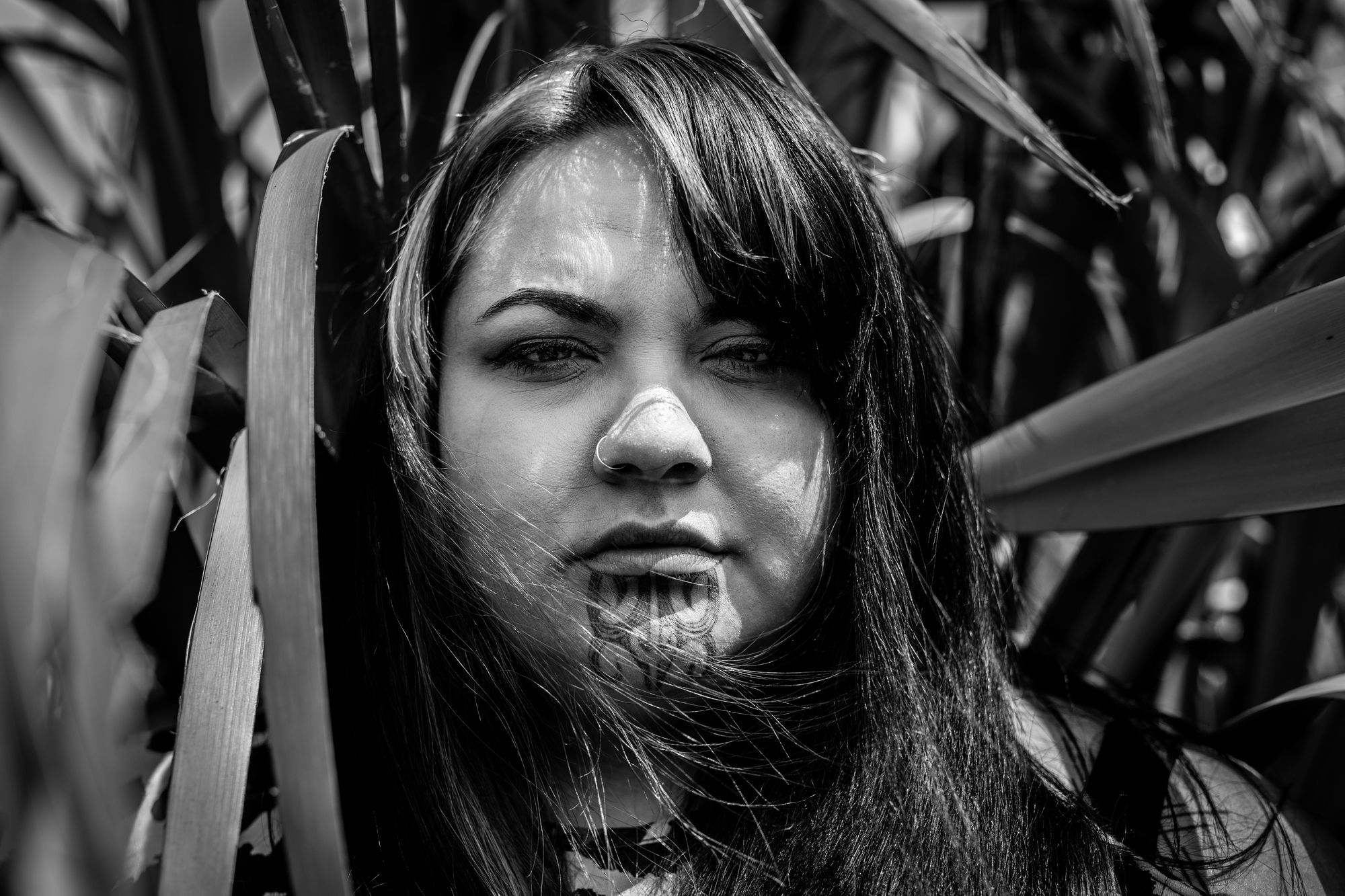HEAL-ing: A Response to Simone Kaho’s HEAL!
Simone Kaho's second poetry book, HEAL!, is raw, unrelenting and visceral - in navigating trauma, the patriarchy and toxic masculinity as a Tongan-Pākehā survivor. Kahu Tumai responds.
Trigger warning: Both this review and HEAL! contain themes of sexual assault, sexual activity, violence, drugs and alcohol.
Every time I open a book I learn a little more about myself. After reading Simone Kaho’s new poetry collection HEAL!, a set of heavy, nostalgic and sticky works that knit to your insides like glue, the sentiment still holds true. Through her gritty, introspective and interrogating poetry I was transported to some of the hardest times in my life and offered glimpses into my own post-sexual-assault ruminations.
The collection begins with ‘If we work backwards…’, which places the reader in the present and sets up the forthcoming poems in the past. We are then abruptly led through a sexual assault in the poem ‘...intestines, lifetimes, memories…’. This sets the tone for the reader to experience the nature of PTSD through Kaho’s eyes. Her poems drop in and out of first-, second- and third-person narrative to reinforce the ways in which flashbacks and memories come upon you as nightmarish hallucinations. Kaho’s writing conveys the frantic uneasiness of panic attacks and addiction, while carefully encapsulating the fraught navigations of being a woman (with Polynesian ancestry) in relation to patriarchy and toxic masculinity. Her honest, messy and unrelenting words dive deep into the disarray of trauma.
HEAL!, a set of heavy, nostalgic and sticky works that knit to your insides like glue
The true gift of her works are the delightful offerings of dreamy gardenscapes, intricate floral descriptions and memories of her Tongan father juxtaposed with dead birds, alcoholism and the opportunities of exploring satisfyingly violent alternatives to traumatic events. These glimpses of the oppositional restructure the perceived role of a victim. Kaho offers us a counter-narrative – that we have agency to remember beyond the trauma, to look to our whakapapa and environment for healing, and that survival and healing are not separate, linear, or clean-cut things.
The poem ‘I don’t cut but…’ shifts me to an experience in my early teenage years. The angst of the poem pushes and pulls on the tendrils between agency, sexuality and femininity; a dance of occupying space with men. I am 14 again, too old to be told what to do, and too young to understand how to make safe choices. There is a sick kind of beauty in giving a traumatised teenage brain the unfettered flight of sexuality… if only to see what trouble it lands itself in. Years later I’d realise most of the situations I found myself in as a teen were the result of failed opportunities for people to care for me as a child. At fourteen it felt like there was no safe way to navigate men without giving up parts of myself, so I did, and they loved it.
we have agency to remember beyond the trauma, to look to our whakapapa and environment for healing
During a creative-writing class this year we were visited by canonical poet Tusiata Avia, who spoke to us about her experience as a writer. Her writing is famous for its punchy wit, unapologetic interrogation of whakapapa, and staring down Pākehā square in the eye, all of which I have been incredibly inspired by. While imparting her wisdom to our cohort, somewhere between talking about disability and writing techniques, Avia bestowed this comment:
“Poetry is therapy for me, really a way of working through shit.”6
I admit, I am attracted to the ghosts that show up in other people’s writing. These shared moments of anguish feel profound, especially when one hits a trigger point. We all hold onto parts of our trauma like that well-worn pair of underwear we still wear every week. They’re shamefully bleached from our natural secretions, with holes that give them some kind of familiarity (despite the ugliness of it all). We look to these undies as unseen support; they are the ‘first day of period’ undies, the ‘staying at home day’ undies, undies for our most vulnerable self. For many of us with historical trauma, there is comfort in the ugly. The best thing about this type of attraction to profound, ugly poetry is that, like those undies, it can be a conduit to connecting with our most traumatised selves on our own terms; a place to reflect and sit with the pain in a supportive, connected way.
We all hold onto parts of our trauma like that well-worn pair of underwear we still wear every week
In her acknowledgements Kaho writes:
“Trauma has influenced the shape of my life, but I’m as committed to healing as I am to writing.”7
What I appreciate the most in Kaho’s writing are the subversive narratives she offers up as pathways to that healing. In ‘...trying to rape me’,8 I was reminded that when faced with depravity and powerlessness we still have the ability to dream. We can dream that things might change for us, or dream that we will find a pathway to heal, or, more satisfyingly (and on brand with trauma if you believe the memes), we can dream the thousand ways in which we could maim and murder those who drove this mamae into us.
Violence does not always beget violence, but sometimes we want it to. To take back the power ripped from us is a fantasy some of us share. A part of Kaho’s way of confronting her pain is to reimagine those circumstances into subversive narratives of violence turned back onto her attacker. Dreaming (of utu, revenge, or compensation) is something women of Indigenous ancestry are so often systemically deprived of. Alongside Kaho’s work I look to wāhine writers like Avia, Becky Manawatū and Ana McAllister to assuage my proclivity for retaliatory brutality towards violent men (and colonisers9) who have hurt me. Although, because we are women of colour, expressing our desires for dismemberment may label us the angry Brown woman, or violent, or unhinged, or any other literal gaslighting, in the attempt to quieten us into victimhood instead of being an active participant in our own healing.
Dreaming (of utu, revenge, or compensation) is something women of Indigenous ancestry are so often systemically deprived of
The irony is not lost on me that we, Indigenous women subjugated to violent men, are labelled angry Brown women. Traumatic experiences at the hands of men are glossed over, somehow lost behind our show of imaginary revenge. How do writing about violence and perpetrating real-life violence magically come under the same system of judgement? Do we criticise the likes of George R R Martin or Stephen King for writing imagined violence, often against women? Or is it that we, as Brown women, are only meant to write about our strength and resilience, and not about the very real, horrific, raw and violent acts done to us and what those experiences inspire in us?
I want…
When the man in the poetry pub tightened his grip on my hand after shaking it
I planted a glass in his head.
In some alternate reality.
and
It’s beautiful how ready I was
to hold his
eyeball in my fist.
and
Deciding to kill someone who’s sexually assaulting you
is still a place in you
if you escape.12
- Simone Kaho, “If we work backwards…,” in HEAL! (Auckland: Saufo‘i Press, 2022), 3.
- Kaho, “...intestines, lifetimes, memories…,” 4.
- Kaho, “I don’t cut but…,” 19.
- Kaho, “...intestines, lifetimes, memories…,” 5.
- Kaho, “...intestines, lifetimes, memories…,” 6.
- Tusiata Avia, Guest Lecture, CREW260 paper, Victoria University of Wellington Te Herenga Waka, 1 August 2022.
- Kaho, “Acknowledgements,” 80.
- Kaho, “...trying to rape me,” 60.
- By “colonisers” I refer to those that enact racism under ideologies of white supremacy stemming from colonisation.
- Kaho, “...*deflowered* by Bowie,” 17.
- Kaho, “...into the abyss,” 61.
- Ibid.
This essay is featured as part of Issue 07: Aroha, guest-edited by Natasha Matila-Smith. Click here to read other published essays in the issue!

